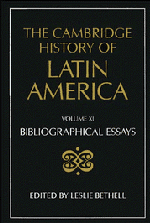Book contents
- Frontmatter
- I THE INDIGENOUS PEOPLES OF MIDDLE AND SOUTH AMERICA ON THE EVE OF THE CONQUEST
- II COLONIAL SPANISH AMERICA
- III COLONIAL BRAZIL
- IV THE INDEPENDENCE OF LATIN AMERICA
- V LATIN AMERICA: ECONOMY, SOCIETY, POLITICS, c. 1820 TO c. 1870
- VI LATIN AMERICA: ECONOMY, SOCIETY, POLITICS, c. 1870 to 1930
- 1 Latin America and the international economy, 1870–1914
- 2 Latin America and the international economy, 1914–1929
- 3 Population
- 4 Rural Spanish America
- 5 The growth of cities
- 6 Industry
- 7 The urban working class and early labour movements
- 8 The Catholic church
- 9 Mexico: Restored republic and Porfiriato, 1867–1910
- 10 The Mexican Revolution, 1910–1920
- 11 Mexico: Revolution and reconstruction in the 1920s
- 12 Central America
- 13 Cuba
- 14 Puerto Rico
- 15 The Dominican Republic
- 16 Haiti
- 17 Argentina: Economy, 1870–1914
- 18 Argentina: Society and politics, 1880–1916
- 19 Argentina, 1914–1930
- 20 Uruguay
- 21 Paraguay
- 22 Chile
- 23 Bolivia
- 24 Peru
- 25 Colombia
- 26 Ecuador
- 27 Venezuela
- 28 Brazil: Economy
- 29 Brazil: Society and politics, 1870–1889
- 30 Brazil: Society and politics, 1889–1930
- VII LATIN AMERICA: ECONOMY, SOCIETY, POLITICS, 1930 to c. 1990
- VIII IDEAS IN LATIN AMERICA SINCE INDEPENDENCE
- IX LATIN AMERICAN CULTURE SINCE INDEPENDENCE
- X THE INTERNATIONAL RELATIONS OF LATIN AMERICA SINCE INDEPENDENCE
- THE CAMBRIDGE HISTORY OF LATIN AMERICA
5 - The growth of cities
from VI - LATIN AMERICA: ECONOMY, SOCIETY, POLITICS, c. 1870 to 1930
Published online by Cambridge University Press: 28 March 2008
- Frontmatter
- I THE INDIGENOUS PEOPLES OF MIDDLE AND SOUTH AMERICA ON THE EVE OF THE CONQUEST
- II COLONIAL SPANISH AMERICA
- III COLONIAL BRAZIL
- IV THE INDEPENDENCE OF LATIN AMERICA
- V LATIN AMERICA: ECONOMY, SOCIETY, POLITICS, c. 1820 TO c. 1870
- VI LATIN AMERICA: ECONOMY, SOCIETY, POLITICS, c. 1870 to 1930
- 1 Latin America and the international economy, 1870–1914
- 2 Latin America and the international economy, 1914–1929
- 3 Population
- 4 Rural Spanish America
- 5 The growth of cities
- 6 Industry
- 7 The urban working class and early labour movements
- 8 The Catholic church
- 9 Mexico: Restored republic and Porfiriato, 1867–1910
- 10 The Mexican Revolution, 1910–1920
- 11 Mexico: Revolution and reconstruction in the 1920s
- 12 Central America
- 13 Cuba
- 14 Puerto Rico
- 15 The Dominican Republic
- 16 Haiti
- 17 Argentina: Economy, 1870–1914
- 18 Argentina: Society and politics, 1880–1916
- 19 Argentina, 1914–1930
- 20 Uruguay
- 21 Paraguay
- 22 Chile
- 23 Bolivia
- 24 Peru
- 25 Colombia
- 26 Ecuador
- 27 Venezuela
- 28 Brazil: Economy
- 29 Brazil: Society and politics, 1870–1889
- 30 Brazil: Society and politics, 1889–1930
- VII LATIN AMERICA: ECONOMY, SOCIETY, POLITICS, 1930 to c. 1990
- VIII IDEAS IN LATIN AMERICA SINCE INDEPENDENCE
- IX LATIN AMERICAN CULTURE SINCE INDEPENDENCE
- X THE INTERNATIONAL RELATIONS OF LATIN AMERICA SINCE INDEPENDENCE
- THE CAMBRIDGE HISTORY OF LATIN AMERICA
Summary
By way of introduction, several important studies on Latin American cities, which range beyond the period 1870–1930, are particularly useful: Jorge E. Hardoy and Carlos Tobar (eds.), La urbanización en la América Latina (Buenos Aires, 1969), especially the essay on Argentina by José Luis Bacigalupo; Jorge E. Hardoy (ed.), Urbanization in Latin America: Approaches and Issues (New York, 1975), especially the articles by Hardoy himself and by Richard M. Morse; Richard M. Morse (ed.), Las ciudades latinoamericanas, 2 vols. (Mexico, D.F., 1973), I, Antecedentes, 2, Desarrollo histórico; and José Luis Romero, Latinoamérica: Las ciudades y las ideas (Mexico, D.F., 1976). In addition, useful items appear in the following collections: Institut des Hautes Études de l’Amérique Latine, Villes et régions en Amérique Latine (Paris, 1970; Spanish trans., Mexico, D.F., 1973), with studies on Cuzco, Medellín, Guadalajara and the cities of Minas Gerais, Brazil; Richard P. Schaedel, Jorge E. Hardoy and Nora Scott Kinzer (eds.), Urbanization in the Americas from Its Beginnings to the Present (The Hague, 1978), especially the articles by Alejandro Rofman, Richard M. Morse, James R. Scobie, Roberto Cortés Conde and Nancy López de Nisnovich, Spencer L. Leitman and Jorge Balán; and Francisco de Solano (ed.), Historia y futuro de la ciudad iberoamericana (Madrid, 1986), especially the essay by Rolando Mellafe, ‘La desruralización de la ciudad hispanoamericana en el siglo XIX’, 75–88.
Because of the complex, multidimensional nature of the urban experience, historical scholarship on the problems and issues of urbanization has drawn heavily on the insights of disciplines outside history. The sociologists have been the most productive, starting with early influential studies such as Andrew H. Whiteford, Two Cities of Latin America: A Comparative Description of Social Classes (Beloit, Wis., 1960), a stimulating comparison of Popayán, Colombia, and Querétaro, Mexico, which has since been refocused on Popayán alone in An Andean City at Mid-Century: A Traditional Urban Society (East Lansing, Mich., 1977); Phillip M. Hauser and Leo F. Schnore (eds.), The Study of Urbanization (New York, 1965), especially the chapters by Gideon Sjoberg and by Schnore; and Gerald Breese (ed.), Urbanization in Newly Developing Countries (Englewood Cliffs, N.J., 1969).
- Type
- Chapter
- Information
- The Cambridge History of Latin America , pp. 341 - 349Publisher: Cambridge University PressPrint publication year: 1995



